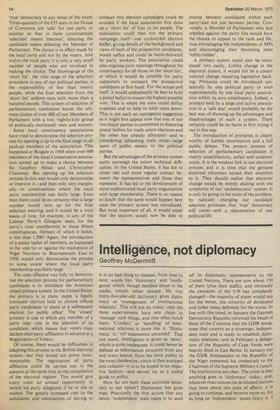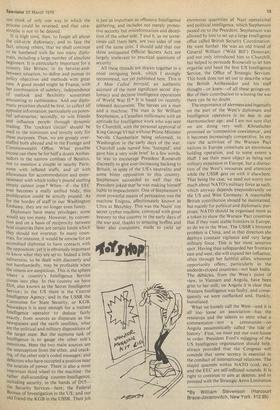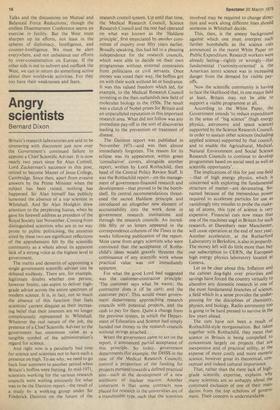Intelligence, not diplomacy
Geoffrey McDermott
It is no bad thing to reassess, from time to time, words like 'diplomacy' and 'intelligence' which, though bandied about in the media, remain rather opaque. My tiny thirty-five-year-old dictionary gives diplomacy as 'management of international relations'. This will not do today: only the three super-powers have any claim to 'manage' such things, and they often botch them. 'Conduct' or 'handling' of international relations is more like it. 'Diplomatic' is: '(of statements) uncandid'. That can stand. Intelligence is given as 'news', which is quite inadequate. It could better be defined as information procured from any and every source, from the most public to the most clandestine, which is then analysed and collated—it is to be hoped in an objective fashion—and served up as a useful guide to policy.
How far are both these activities necessary in our epoch? Diplomacy has gone mad. Practically the first action that any newly 'independent' state takes is to send
off its diplomatic representative to the United Nations. There are now about 150 of them (plus their staffs); and obviously the character of the UN has completely changed—the majority of states would say for the better, the minority of developed and richer states definitely for the worse. In line with this trend, in January the German Democratic Republic informed the Head of State of the Comoros that the GDR recognises that country as a sovereign, independent state and is ready to establish diplomatic relations; and in February a delegation of the Republic of Cape Verde were heavily feted in East Berlin. In January too the GDR Ambassador to the Republic of the Niger presented his credentials to the Chairman of the Supreme Military Council. The implications are clear. The point is that anything goes in 'diplomacy' today; and, whatever reservations the developed nations may have about this state of affairs, it is going to continue, and become more so, for as long as 'independent' states fancy it.
can think of only one way in which the Process could be reversed, and that catastrophe is not to be desired.
It is high time, then, to forget all about the old-style diplomacy; and to face the fact, among others, that we shall continue to be lumbered with far too many diplomats, including a large number of absolute beginners. It is particularly important for a country like Britain, in its betwixt-andbetween situation, to define and pursue its Policy objectives and methods with great care. A good model might be France, with her combination of subtlety, independence of outlook and flexibility sometimes amounting to ruthlessness. And our diplomatic priorities should be first, to collect all apposite information, particularly on potential adversaries; secondly, to win friends and influence people through dynamic trading. The 'cocktail circuit' should be used to the minimum and strictly only for these purposes. Then, we are grossly overstaffed both abroad and in the Foreign and Commonwealth Office. What possible excuse can there be for half a dozen Ambassadors in the narrow confines of Benelux, not to mention a couple in nearby Paris; some with inflated staffs, and all with allowances for accommodation and entertainment with which today's pound sterling simply cannot cope? When—if—the EEC ever becomes a really unified body, this Proliferation could be strictly pruned. As for the hordes of staff in our Washington Embassy, they are no longer even funny.
Diplomats have many privileges; some would say too many. However, by convention and on a basis of reciprocity between host countries there are certain limits which they should not overstep. In many countries, for instance, it would be unwise for an accredited diplomat to have contacts with the opposition ; yet it is obviously important to know what they are up to. Indeed a little subversion, to be dealt with discreetly and not hamhandedly, may be profitable when the omens are auspicious. This is the sphere Where a country's Intelligence Service comes into play. In this country we have 1316, also known as the Secret Intelligence Service; in the US there is the Central Intelligence Agency; and in the USSR the Committee for State Security, or KGB. Nowadays it is easy enough for a trained Intelligence operator to deduce fairly exactly, from sources as disparate as the newspapers and the earth satellites, what are the political and military dispositions of the target state. But the supreme task of Intelligence is to gauge the other side's Intentions. Here the two main sources are the interception from the ether, and cracking, of the other side's coded messages; and defectors who have occupied a position near the sources of power. There is also a most important third wheel to the machine: the rather dull-sounding counter-Intelligence, Including security, in the hands of D15— the Security Services—here; the Federal Bureau of Investigation in the US; and our old friend the KGB in the USSR. Their job is just as important as offensive Intelligence gathering, and includes not merely protective security but misinformation and deception of the other side. 5 and 6, as we sometimes call them here, are two sides of one and the same coin. I should add that our three antiquated Official Secrets Acts are largely irrelevant to practical questions of security.
All these threads are drawn together in a most intriguing book, which I strongly recommend, not yet published here. This is A Man Called Intrepid, an authentic account of the most significant secret diplomacy and decisive intelligence operations of World War II.* It is based on recently released documents. The heroes are a man and a machine. The man is Sir William Stephenson, a Canadian millionaire with an aptitude for Intelligence work who was sent by Churchill, with the personal approval of King George VI but without Prime Minister Neville Chamberlain being informed, to Washington in the early days of the war. Churchill code named him 'Intrepid', and gave him a very wide brief. In a few words, he was to encourage President Roosevelt discreetly to give ever-increasing backing to Britain, in spite of the US's neutrality and some bitter opposition to this country. Stephenson succeeded so well that the President joked that he was making himself liable to impeachment. One of Stephenson's most powerful means of persuasion was the machine Enigma, affectionately known as Ultra at Bletchley. This was the Nazis' top secret cypher machine, conveyed with great bravery to this country in the early days of the war and, thanks to amazing boffins and later also computers, made to yield up enormous quantities of Nazi operational and political intelligence, which Stephenson passed on to the President. Stephenson was allowed by him to set up a large Intelligence office called British Security Coordination. He went further. He was an old friend of General William Mild Bill') Donovan; and not only introduced him to Churchill, but helped to persuade Roosevelt to let him organise and head the first US Intelligence Service, the Office of Strategic Services. This book does not set out to describe what the British Ambassador and his staff thought—or knew—of all these goings-on. But of their contribution to winning the war there can be no doubt.
The importance of alertness and ingenuity on the part of the West's diplomats and Intelligence operators is no less in our thermonuclear age; and I am not sure that we are doing very well. Khrushchev promised us 'competitive coexistence', and it becomes increasingly competitive. In my view the activities of the Warsaw Pact nations in Europe constitute an enormous holding operation, and to some extent a bluff. I see their main object as being not military expansion in Europe, but a distraction of the West's resources and attention while the USSR gets on with it elsewhere. That being the case, we need not worry too much about NATO's military force as such, which anyway depends preponderantly on the US and West Germany. A reasonable British contribution should be maintained, but mainly for political and diplomatic purposes. NATO should be organised more as a token to show the Warsaw Pact countries that if they want stable frontiers in Europe, so do we in the West. The USSR's bitterest problem is China, and in that direction she deploys constant vigilance and very large military force. This is her most sensitive spot. Having thus safeguarded her frontiers east and west, she will expand her influence, often through her faithful allies, wherever opportunity offers; particularly in the underdeveloped countries—not least India. The debacles, from the West's point of view, in Vietnam and Angola, have been grist to her mill; on Angola it is clear that Western Intelligence was faulty, and consequently we were outflanked and, frankly, humiliated.
What we loosely call the West—and it is all too loose an association—has the resources and the talents to stem what a commentator—not a communist—on Angola pessimistically called 'the tide of history'. First, we must put our own house in order. President Ford's rejigging of the US Intelligence organisation should help, always provided that the Congress will concede that some secrecy is essential in the conduct of international relations. The stupid quarrels within NATO (cod, etc.) and the EEC are self-inflicted wounds. It is right to continue to aim at détente, and to proceed with the Strategic Arms Limitation *By William Stevenson (Harcourt Brace-Jovanovitch, New York. $12.95) Talks and the discussions on Mutual and Balanced Force Reductions; though the endless Disarmament Conference seems an exercise in futility. But the West must sharpen up its efforts, not least in the spheres of diplomacy, Intelligence, and counter-Intelligence. We must be alert everywhere, and not unbalance our efforts by over-concentration on Europe. If the other side is out to subvert and outflank the West, we can in return do something active about their worldwide activities. For they too have their weaknesses and fears.




































 Previous page
Previous page